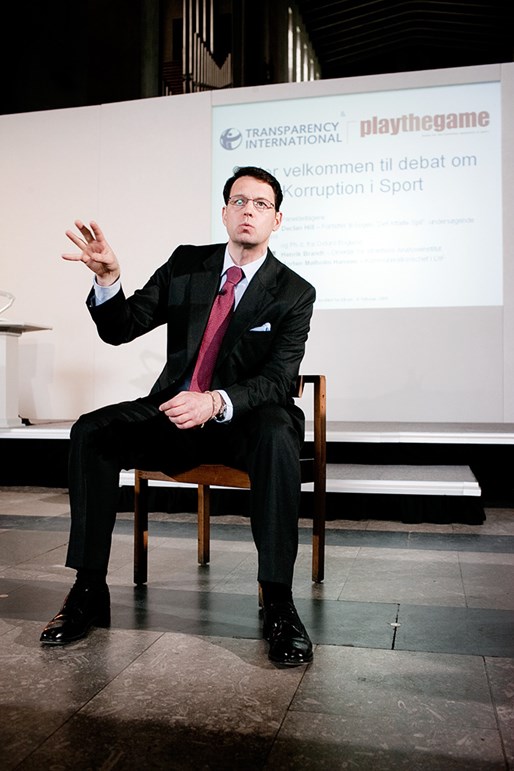J’accuse FIFA

Declan Hill, author of "The Fix" accuses FIFA of not taking nessesary meassures to prevent match-fixing at the World Cup. (Photo from Play the Game 2009)
29.04.2010
By Declan HillMatch-fixers will be at the World Cup in South Africa. They will be there approaching players, referees and team officials and trying to bribe them to fix matches. They will be there because they have been at almost every international football tournament – the Under-17 World Cup, the Under-20 World Cup, the Olympic Football tournament and the Women’s and Men’s World Cups – for the last twenty years. They will be there because there has been no effective action on the part of FIFA to clean up this problem. Here is a list of some of the things that FIFA could have done to make sure that the tournament was corruption-free.
One, FIFA should pay the players directly. The fact is that some of the athletes competing at the world’s biggest sporting event still do not know how much money they will be paid or even if they will be paid at all. It is this dynamic that drives match-corruption. Now, FIFA pays money to the executives of the national football associations. Those executives are supposed to pay their players. However, while most of the executives are honest; some are regarded by the players as so deeply immoral that they would steal money from their own grandmothers, and the players do not trust them.
There are some commentators who are naïve enough to say that World Cup players should be playing only for patriotism or the love of the game. Good point, if no one was getting any money. But as those athletes run onto the field, they know the stadium is sold-out, they know they are being watched by hundreds of millions of people around the world (the 2006 final was seen by 5% of all humanity who have ever existed) and they know that corporations have paid billions of dollars in sponsorship money and television rights. So someone, somewhere is getting a lot of money, why aren’t all the players on all the teams being rewarded properly?
It is very easy to stop the problem. FIFA should pay the players directly. There should be wages and incentive bonuses for every game won, for each stage of the tournament a player helps his team reach, even for the number of goals that a player scores. This money should be transferred directly into the players’ bank accounts by FIFA. These amounts should be publicly announced. This way all players know exactly how much they are supposed to receive and if national associations or sponsors want to add to this money – great. But each World Cup player should not only know how much they will be paid, they should know they will be paid and paid well.
Two, FIFA has implemented an ‘Early Warning System’. It is a good start and a bad joke. It purports to be able to detect signs of World Cup match-fixing by monitoring the gambling market. This is almost impossible. The amount of money bet on World Cup Final matches is so high – estimated at $40 billion for the 2006 World Cup – that observers cannot detect ‘unusual betting patterns’. They can do it for minor matches in obscure leagues; but they cannot do it for the world’s biggest sporting tournament. Moreover, the Early Warning System relies on information from legal, mostly European, bookmakers. They cannot independently verify the betting market where the fixers do most of their work – the illegal Asian gambling market.
Don’t believe this statement? Then take the word of one of the men who runs the Early Warning System – Wolfgang Feldner. Mr. Feldner is hard-working and deeply ethical. He has openly stated the problems of detecting fixes at the World Cup. In November 2009, Mr. Feldner said, “As good as the early warning systems are, they will hardly be able to check the black market. You can’t get information from betting companies that officially do not exist.”
The problems of the Early Warning System don’t stop there. Many bookmakers still do not share information about who is betting. So the EWS officials may be able to tell there is a lot of money on a game, but they cannot tell who placed it. This is a problem. A hypothetical example, there may be $100 million bet on England to beat the United States in the opening rounds. The EWS can see that money, but they cannot see if it is merely 20 million enthusiastic England supporters all betting $5 each, or the wife of one of the American players betting $100 million that her husband’s team will lose.
Finally, there is a still list of unasked and unanswered questions dating back to September 2008 publication of The Fix, about the relationship between the fixers, their runners and some players (The list is available on www.howtofixasoccergame.com).
The questions have not been asked because there is no investigating body specifically tasked to deal with it. FIFA has not established what is standard practice in every North American sport, and increasingly other international sports like ATP tennis and cricket; an integrity unit staffed with ex-policemen and gambling experts. In September 2008, after the publication of The Fix, Michel Platini the president of UEFA, established such an integrity unit for European football. It was instrumental in uncovering a wide network of fixers working in 9 different European countries. Why hasn’t FIFA implemented a similar team?
Until these very basic steps are implemented, the fixers will be back, they will be approaching players and referees and they may, unfortunately, find a few who are willing to listen to them and there will be more fixed matches at a World Cup tournament.





